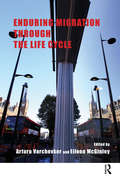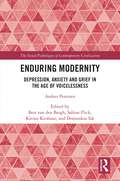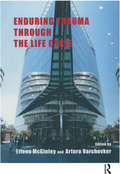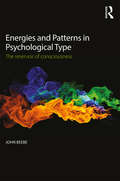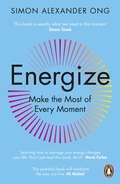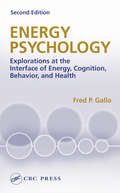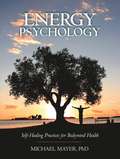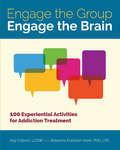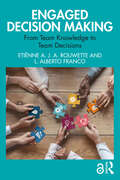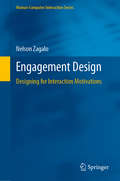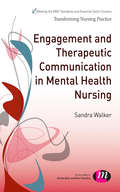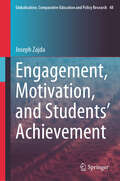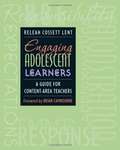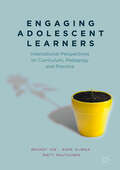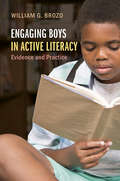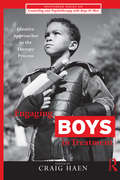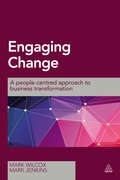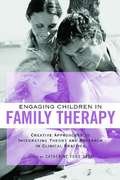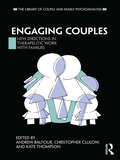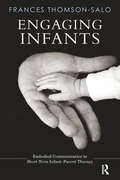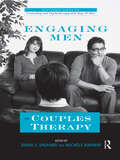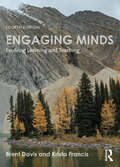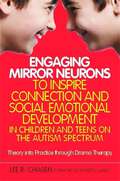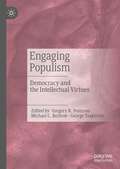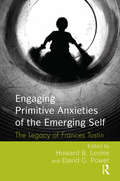- Table View
- List View
Enduring Migration through the Life Cycle
by Arturo Varchevker Eileen McGinleyIn this book, the authors share an interest in and experience of migration in relation to stressed or traumatised patients whom they have treated or through their areas of expertise through the developmental life cycle.
Enduring Modernity: Depression, Anxiety and Grief in the Age of Voicelessness (The Social Pathologies of Contemporary Civilization)
by Anders PetersenThis book brings together the work of the late Anders Petersen, presenting his exciting and innovative transdisciplinary paradigm that offers insights into anxiety, depression and grief, and the connection between these conditions and the failings of contemporary civilization that give rise to them. With attention to the ways in which neoliberal hegemony and its imperatives of ‘performance’, ‘evaluation’, ‘self-realisation’, ‘resilience’ and ‘flexibility’ lead to self-criticism on the part of those who do not measure up to the prevailing criteria, resulting in ailments of mental health, it challenges the paradigmatic diagnosis of such conditions in terms of individual diseases or neurological malfunctions, to be treated by medication and training in order to return the individual to work and life ‘as normal’. An examination of the wrong-headed approach to what Petersen analysed as contemporary social pathologies, Enduring Modernity: Depression, Anxiety and Grief in the Age of Voicelessness will appeal to scholars of sociology and social theory, seeking new understandings aimed at emancipation from social suffering.
Enduring Trauma Through the Life Cycle
by Arturo Varchevker Eileen McGinleyThis is a multi-authored book on the complex subject of psychic trauma as encountered at different stages of the life-cycle, and describes some of the clinical challenges, technical issues and differing theoretical approaches that arise when working with the traumatized individual.The concept of psychic trauma is a complex subject, but one which has more recently gained prominence. This book contains a collection of papers which grew out of a series of talks given by the Psychoanalytic Forum of the British Psychoanalytical Society entitled Trauma Through the Life Cycle. The authors, all highly respected authorities in their fields, give insights into what we mean by psychic trauma, what constitutes a traumatic event, and the psychopathological sequelae to trauma at different stages of life. Judith Trowell and Nick Midgley look at the effects of infantile and childhood traumas. Catalina Bronstein and Sara Flanders, from differing psychoanalytic perspectives consider how childhood traumas can become reactivated in adolescence and colour subsequent developmental situations.
Energies and Patterns in Psychological Type: The reservoir of consciousness
by John BeebeThis book encapsulates John Beebe's influential work on the analytical psychology of consciousness. Building on C. G. Jung's theory of psychological types and on subsequent clarifications by Marie-Louise von Franz and Isabel Briggs Myers, Beebe demonstrates the bond between the eight types of consciousness Jung named and the archetypal complexes that impart energy and purpose to our emotions, fantasies, and dreams. For this collection, Beebe has revised and updated his most influential and significant previously published papers and has introduced, in a brand new chapter, a surprising theory of type and culture. Beebe's model enables readers to take what they already know about psychological types and apply it to depth psychology. The insights contained in the fifteen chapters of this book will be especially valuable for Jungian psychotherapists, post-Jungian academics and scholars, psychological type practitioners, and type enthusiasts.
Energize: Make the Most of Every Moment
by Simon Alexander OngWinner of the 2023 Business Book Award for Wellness and Wellbeing'This book is exactly what we need in this moment' Simon Sinek, author of Start With Why'Learning how to manage your energy changes your life. Don't just read this book, do it!' Marie Forleo, author of Everything is FigureoutableIn Energize, award-winning life coach Simon Alexander Ong introduces you to the art and science of energy management. In a world where we are always on, Ong coaches you to work with your natural energy resources to recognize your most energized state - when to push and when to recoup - so that you can work sustainably towards your biggest goals.You'll learn how to:- Speak less and listen more- Stop treating your health as a side hustle- Silence your inner critic and listen to your inner guide instead- Progress faster by saying no to the activities that are holding you backIt's time to find out what you can achieve when you feel energized.'Simon provides practical advice to help you achieve your full potential in every area of your life. Exceptional!' Dr Marshall Goldsmith, author of Triggers'Learning how to energize ourselves is key to being happy and successful' Shaa Wasmund MBE, author of How to Fix Your Sh*t
Energy Psychology
by Fred P. GalloEnergy Psychology: Explorations at the Interface of Energy, Cognition, Behavior, and Health, Second Edition introduces the exciting new paradigm of energy psychology and presents the latest research on the subject. This second edition begins by tracing the roots of energy psychology and contrasting them with contemporary approaches, and the
Energy Psychology: Self-Healing Practices for Bodymind Health
by Michael MayerEnergy Psychologypresents a comprehensive approach to healing that combines leading-edge Western bodymind psychological methods with a broad system of ancient, sacred traditions. Incorporating Dr. Mayer's integral approach called Bodymind Healing Psychotherapy,Energy Psychologydraws on Chinese medicine approaches, including Qigong and acupressure self-touch; kabalistic processes; methods drawn from ancient traditions of meditation and postural initiation; and psycho-mythological storytelling techniques. Drawing on thirty years of training in Tai Chi and Qigong, Dr. Michael Mayer shows how integrating the essences of these traditions and methods can restore vitality and give the average person self-healing tools for physical and mental health. Unlike the quick-fix books on energy restoration, this book uses timetested, age-old practices from sacred traditions in combination with well-established clinical approaches. Dr. Mayer teaches readers bodymind healing methods to treat anxiety, chronic pain, addictions, hypertension, insomnia, trauma, and other prevalent conditions. Written in a clear, intelligible style, Energy Psychology includes real-life case studies that highlight the effectiveness of his techniques. From the Trade Paperback edition.
Engage the Group, Engage the Brain
by Roxanna Erickson-Klein Kay ColbertA highly innovative collection of activities for use with groups and individuals in addiction treatment settings. Designed to creatively utilize the mind-body connection, these activities are engaging and fun, linked with evidence-based interventions and drawn on emerging brain research, providing a window into reaching clients who may be resistant to traditional talk therapy.Kay Colbert, LCSW, works in private practice in Dallas, Texas, specializing in adult addiction, mental health, trauma, pain management, anxiety, and women's issues.Roxanna Erickson-Klein, PhD, LPC, works in private practice in Dallas, Texas, and serves on the Board of Directors of the Milton H. Erickson Foundation.
Engaged Decision Making: From Team Knowledge to Team Decisions
by Etiënne A. Rouwette L. Alberto FrancoIn the knowledge economy, teams play a central role in decisions made within and across organisations. The reason why teams with diverse compositions are often used is arguably their ability to develop solutions that none of their members could have produced alone. Systems design, strategy and policy development, risk management, and innovation are just a few of the areas that call for team decisions. Unfortunately, a considerable number of behavioural research studies show that teamwork is fraught with difficulties. Teams often underestimate their fallibility, struggle with conflict, or are unable to share and integrate critical information effectively. Indeed, the evidence shows that two out of three teams do not achieve their goals and half of organisational decisions – many of which are team decisions – fail.In this book, the authors draw from research in psychology, decision and systems sciences – as well as their own research and consulting work that spans more than 20 years – to show how designed interventions can enable team decision making to become rigorous, transparent, and defensible. They cover theory and practice regarding the design, delivery, and evaluation of interventions to support team decision making in situations of varied complexity. Written as an applied resource for researchers and advanced students in particular, this book offers a guide to proven interventions that enhance the process of making team decisions and increase the chances of superior team results.The Open Access version of this book, available at www.taylorfrancis.com, has been made available under a Creative Commons Attribution-Non Commercial-No Derivatives (CC-BY-NC-ND) 4.0 license.
Engagement Design: Designing for Interaction Motivations (Human–Computer Interaction Series)
by Nelson ZagaloInteractive media designers have been discussing modes to optimize interaction design beyond mere usability. With the arrival of Emotional Design followed by the success of the User Experience (UX) approaches, the discussion continued and augmented. Experience has become a complex buzzword, which is more about the subject’s experience than the product, and this is why it's difficult, or even impossible, to define it in a concise manner. We propose to move the discussion from Experience towards Engagement, to emphasize the design of the relationship between artefacts, contexts and users. Engagement asks for a more concrete type of experience, with specific needs, motives, skills and competences, which can be more clearly worked into the design of artefacts. Engagement also differs from other concepts e.g. fun, enjoyment, happiness or well-being and is open enough to grant freedom to designers in creating their personal world views. To push this new approach, we offer in this book a full model for the design of engagement in interactive media, still believing it can be applied beyond that. The model is arranged around what we call the three engagement streams: Progression, Expression and Relation.
Engagement and Therapeutic Communication in Mental Health Nursing (Transforming Nursing Practice)
by Sandra WalkerBeing able to engage with service users and communicate effectively is a fundamental skill identified by the NMC and required of all mental health nurses. The reality is that building rapport and developing therapeutic relationships does not come instinctively for everyone. The authors have responded to this with a book that explains the different communication theories and models and goes on to show students how they work in the real world. Innovative exercises encourage reflection and enable students to practice their developing communication skills as they progress. Throughout the book the authors are focussed on promoting recovery and have put the service user at the centre of the discussion, ensuring that their voice is heard. Key features: - Covers the communication content of the new NMC Standards and Essential Skills Clusters for pre-registration degree-level nursing education - Focussed on promoting recovery and adopts a person-centred approach - Interactive style using realistic scenarios and case studies making theory easy to apply to practice - Includes a chapter co-authored by a service user offering a unique insight.
Engagement, Motivation, and Students’ Achievement (Globalisation, Comparative Education and Policy Research #48)
by Joseph ZajdaThis book analyses discourses of the use of engagement and motivation in schools globally. It focuses on the overall impact of engagement on teachers, students’ motivation, students’ well-being, and standards. It examines the role of engagement and motivation impacting teachers and students in the classroom, and the overall impact of inclusive classroom models to improve their performance in the classroom. The book analyses topics such as cultural identities and engagement, students’ personalities and their impact on learning, the role of intelligence in learning, social learning, engagement in collaborative groups, and teachers’ role in promoting engagement in the classroom. The book contributes in a very scholarly way, to a more holistic understanding of the nexus between globalisation, dominant models of motivation, and students’ engaging learning environments, and their academic achievement.
Engaging Adolescent Learners: A Guide for Content-area Teachers
by Releah Cossett LentExamine what it means to engage young adults in their learning and find out what classrooms with engaged students look, sound, and feel like. Let Releah Lent help you transform your classrooms into places where students have the freedom to satisfy their natural inclination to explore. With Engaging Adolescent Learners at your side, you'll have everything you need to help even the most reluctant students find a way to learn that works for them.
Engaging Adolescent Learners: International Perspectives on Curriculum, Pedagogy and Practice
by Brandy Yee Anne Sliwka Matti RautiainenThis book draws on detailed case studies from three very different countries and school systems to explore the early adolescent learner and the middle years of learning, both of which are often overlooked in the literature. An abundance of research shows the importance of the middle years in putting early adolescent learners on the path to success in further education, careers, and general wellbeing. By focusing on bringing current research to life through the sharing of practical examples and lived experiences of practitioners, this book explores how issues such as curriculum reform, inclusive philosophies, instructional design, and assessment practices are supporting the conditions in which effective middle years learning can unfold. A comparative approach, using data from Canada, Germany and Finland, is utilized to critically examine the effects of the pedagogical methods employed by teachers, and the learning environments in which formal education takes place. The book makes a compelling case for the importance of fostering student voice and choice, and developing new ways of engaging the school community as a whole, and makes a valuable contribution to the discourse concerning early adolescent learners and the middle years of schooling.
Engaging Boys in Active Literacy: Evidence and Practice
by William G. BrozoToo many boys do not like to read, are choosing not to read, and are suffering academically as a result. All concerned adults need to redouble their efforts to ensure that boys who bring the greatest challenges to our classrooms and schools receive responsive literacy texts and practices to increase their chances for academic, personal, and occupational success. This book is more than a compendium of techniques, it also provides an analysis of the research literature on central issues and related aspects of literacy and learning for boys. The author identifies issues that impinge on boys' literacy development and explores what the research literature has to say about these issues. The descriptions of how teachers have used engaging texts and practices to help boys overcome low literacy engagement and skill in order to stay on course as readers and writers are highly informative and practical as models of best practice.
Engaging Boys in Treatment: Creative Approaches to the Therapy Process (The Routledge Series on Counseling and Psychotherapy with Boys and Men)
by Craig HaenTraditional therapy can often be an off-putting experience for boys as it is in direct opposition to the ways they generally interact and connect with others. This book explores a variety of creative approaches that professionals can use to enhance the clinical experience and better reach their young male clients. Chapters discuss the theory behind and implementation of various creative approaches to therapy with boys, such as play therapy, including sports, movement, and gross-motor activity; animal-assisted therapy; the use of video games and computers; the use of superheroes in role play, metaphor, and play therapy; and art therapy. Attention is also given to methods for working with several subgroups of boys that require specialized treatment approaches, including gender variant and sexual minority boys and boys with ADHD. The first book of its kind, mental health professionals will find this a comprehensive and highly valuable text to help them understand, help, and support boys and their development.
Engaging Change
by Mark Jenkins Mark WilcoxAny significant organizational level change initiative is dependent on the engagement of the people working in that organization. Without engagement, change will falter and ultimately fail. Engaging Change goes behind the scenes of change management to help managers, consultants and practitioners understand why some things work and why others don't. Engaging Change addresses current challenges such as how to understand the environmental context driving the need for change; how to initiate and sustain momentum throughout the change programme; how to institutionalize structural and behavioural change; and how to create compelling visions. With case studies from Sony, Nestlé, Redcats (who own La Redoute, for example) and the British Army, the text provides practice-based insights into the realities of leading sustainable change.
Engaging Children in Family Therapy: Creative Approaches to Integrating Theory and Research in Clinical Practice (Routledge Series on Family Therapy and Counseling)
by Catherine Ford SoriA common question at the initial meeting of a family therapist and a new client(s) is often whether or not to include a child or children in the counseling sessions. The inclusion of a child in the family therapy process often changes the dynamic between client and therapist -- and between the clients themselves -- within the context of the counseling sessions. And yet, although this is such a common experience, many counselors and family therapists are not adequately equipped to advise parents on whether to include a child in therapy sessions. Once the child does make an appearance in the counseling session, the therapist is faced with the challenges inherent in caring for a child, in addition to many concerns due to the unique circumstance of the structured therapy. Counseling a child in the context of a family therapy session is a specific skill that has not received the attention that it deserves. This book is intended as a guide for both novice and experienced counselors and family therapists, covering a wide range of topics and offering a large body of information on how to effectively counsel children and their families. It includes recent research on a number of topics including working with children in a family context, the exclusion of children from counseling, and counselor training methods and approaches, the effectiveness of filial play therapy, the effects of divorce on children, and ADHD. Theoretical discussion is given to different family therapy approaches including family play therapy and filial play therapy. Central to the text are interviews with leaders in the field, including Salvador Minuchin, Eliana Gil, Rise VanFleet and Lee Shilts. A chapter devoted to ethical and legal issues in working with children in family counseling provides a much-needed overview of this often overlooked topic. Chapters include discussion of specific skills relevant to child counseling in the family context, case vignettes and examples, practical tips for the counselor, and handouts for parents.
Engaging Couples: New Directions in Therapeutic Work with Families
by Kate Thompson Christopher Clulow Andrew BalfourThis book is a challenge to the silos in our human services that an ‘atomised’ focus gives rise to. They are evident in the chasm that can exist between child and adult mental health care, between competing therapeutic approaches and, most importantly for this volume, in the segmentation of support for adults who are partners as well as parents. The contributors, all with substantial experience of providing front-line services, identify the problem their intervention is designed to address, provide a conceptual justification for the approach they have used and supply evidence for its effectiveness. Vivid illustrations bring the work to life and provide examples of best practice whose relevance can readily be transported to different settings. Unusual in bringing together approaches that encompass internal and external realities in responding to the challenges of physical constraint, emotional distress and an often-volatile social environment, the contributions are assembled to highlight a common thread that can inform services at different stages of the life course. Each chapter is accompanied by a commentary from specialists in their field who elucidate and critique the key points made by the authors and help the experience of reading the book to be one of dialogue. Engaging Couples: New Directions in Therapeutic in Work with Families explores new ways of approaching some of the key issues of contemporary family life, including depression, living with long-term conditions, inter-parental conflict and domestic abuse to name but a few, refracting them through a lens that sees our relationships as fundamental to the fabric of our lives – the most important social capital of all. It represents essential reading for clinicians and family practitioners of all persuasions, and those that train and support them in their work.
Engaging Infants: Embodied Communication in Short-Term Infant-Parent Therapy
by Frances Thomson-SaloThe book begins by describing, within a psychodynamic approach, some traits an infant may bring to an intervention, followed by descriptions of interventions in several specialised perinatal settings. Several chapters focus on parent-infant families who have experienced considerable anxiety and depression, and those who have experienced trauma and lived borderline experiences or of mental illness. An innovative intervention which successfully engaged young parents and their infants so that most of them felt they could understand and relate to their newborn infant is next outlined. Turning to most parents of an infant in a neonatal intensive care unit who feel traumatised which may impact on the emotional relationship with their infants, there is often a need for psychodynamic exploration before these difficulties can be modulated. With such interventions the staff become more containing and may more likely seek an intervention for a premature infant in their own right, attuned to the meaning of his or her mood and behaviour. Infant-parent therapy in paediatric contexts, infants in groups, and relating to infant and parents in the context of family violence are briefly described.
Engaging Men in Couples Therapy: In Couples Therapy (The Routledge Series on Counseling and Psychotherapy with Boys and Men)
by David S. Shepard Michèle HarwayThis book will help practitioners overcome one of the leading challenges in couples therapy: working effectively with the male partner. Men have unique needs and psychological issues that many clinicians may not recognize or know how to address. This volume presents chapters by the leading practitioners associated with current therapeutic models, including Emotionally Focused Couple Therapy, Imago Relationship Therapy, Integrated Behavioral Couple Therapy, and more. Using in-depth case examples, they demonstrate how their approaches can be adapted to be "male-sensitive" and respond to the ambivalence so many men experience about couples work. Special topics are also addressed, including infidelity, cultural diversity, working with veterans, and fathering issues. This book will enrich therapists’ work with couples, making treatment a welcoming experience for both partners and the treatment process more gratifying for the therapist.
Engaging Minds: Evolving Learning and Teaching
by Brent Davis Krista FrancisEngaging Minds: Evolving Learning and Teaching explores the diverse beliefs and practices that define the current landscape of formal education. The revised, updated, and expanded fourth edition of this groundbreaking introduction to current interdisciplinary studies of teaching and teacher education is structured around five prominent "frames" of formal education, together offering an overview of the historical and conceptual influences on educational practice: Early Formal Education – likely emerged alongside the creation of origin myths and the invention of symbol-based writing systems, presenting needs for individuals charged with communicating, interpreting, and maintaining such knowledge; Standardized Education – began to unfold in the 1600s, when public education was invented as a response to the cultural convulsions of industrialization, urbanization, and imperialism; Authentic Education – rose to prominence over the last century as researchers began to untangle the complexity of human cognition; Democratic Citizenship Education – fuelled by civil rights movements of the 1960s, with the realization that schools often contribute to (or at least help to perpetuate) inequities and injustices; Systemic Sustainability Education – an emerging trend, as schools and other cultural institutions find themselves out of step with the transition from a mechanization-focused industrialized society to an ecologically-minded and information-based society. These frames serve as the foci of the five chapters of the book, each with three sections that deal, respectively, with history, epistemology, and pedagogy within the frame. Richly illustrated and designed, additional pedagogical features include multiple strategies to highlight and distinguish important vocabulary in the text, as well as suggestions for delving deeper into a given topic. The fourth edition is also complemented by an online resource, learningdiscourses.com, that provides analyses of more than two thousand discourses on learning in education – including summaries and critiques, along with details on their authorship, their imagery, and their associated discourses.
Engaging Mirror Neurons to Inspire Connection and Social Emotional Development in Children and Teens on the Autism Spectrum: Theory into Practice through Drama Therapy
by Lee R. Chasen Robert J LandyThe innovative drama therapy programme develops social skills in children and teens on the autism spectrum by looking to the mirror neuron system as the key to social connection and interaction. Lee R. Chasen provides an accessible explanation of the approach's grounding in neuroscience, followed by a thirty-session program involving creative tools such as guided play, sociometry, puppetry, role-play, video modeling and improvisation. Scenarios drawn from his own practice provide useful insights into both the practicalities and positive results of this unique approach. This ground-breaking book will be of interest to drama and creative arts therapists, as well as teachers, school psychologists, counsellors and other professionals who work with children on the autism spectrum.
Engaging Populism: Democracy and the Intellectual Virtues
by Gregory R. Peterson Michael C. Berhow George TsakiridisThe past two decades have witnessed an intensifying rise of populist movements globally, and their impact has been felt in both more and less developed countries. Engaging Populism: Democracy and the Intellectual Virtues approaches populism from the perspective of work on the intellectual virtues, including contributions from philosophy, history, religious studies, political psychology, and law. Although recent decades have seen a significant advance in philosophical reflection on intellectual virtues and vices, less effort has been made to date to apply this work to the political realm. While every political movement suffers from various biases, contemporary populism’s association with anti-science attitudes and conspiracy theories makes it a potentially rich subject of reflection concerning the role of intellectual virtues in public life. Interdisciplinary in approach, Engaging Populism will be of interest to scholars and students in philosophy, political theory, psychology, and related fields in the humanities and social sciences.
Engaging Primitive Anxieties of the Emerging Self: The Legacy of Frances Tustin
by Howard B. LevineFrances Tustin was a pioneering child psychotherapist who broke new ground in working with autistic children in the latter half of the twentieth century. This book amplifies and extends contributions by Tustin to the study and treatment of autism, autistic spectrum disorders and autistic defences and enclaves in non-autistic patients. It offers readers a contribution to the understanding and treatment of primitive mental states and primitive character disorders.
